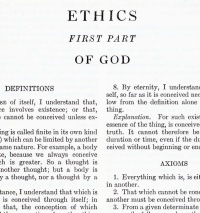Normative ethics
From The Art and Popular Culture Encyclopedia

|
Related e |
|
Featured: |
Normative ethics is the branch of philosophical ethics that investigates the set of questions that arise when we think about the question “how ought one act, morally speaking?” Normative ethics is distinct from meta-ethics because it examines standards for the rightness and wrongness of actions, while meta-ethics studies the meaning of moral language and the metaphysics of moral facts. Normative ethics is also distinct from descriptive ethics, as the latter is an empirical investigation of people’s moral beliefs. To put it another way, descriptive ethics would be concerned with determining what proportion of people believe that killing is always wrong, while normative ethics is concerned with whether it is correct to hold such a belief. Hence, normative ethics is sometimes said to be prescriptive, rather than descriptive. However, on certain versions of the meta-ethical view called moral realism, moral facts are both descriptive and prescriptive at the same time.
Broadly speaking, normative ethics can be divided into the sub-disciplines of moral theory and applied ethics. In recent years the boundaries between these sub-disciplines have increasingly been dissolving as moral theorists become more interested in applied problems and applied ethics is becoming more profoundly philosophically informed.
Traditional moral theories were concerned with finding moral principles which allow one to determine whether an action is right or wrong. Classical theories in this vein include utilitarianism, Kantianism, and some forms of contractarianism. These theories offered an overarching moral principle to which one could appeal in resolving difficult moral decisions.
In the 20th century, moral theories became more complex and were no longer concerned solely with rightness and wrongness, but were interested in many different kinds of moral status. This trend may have begun in 1930 with W. D. Ross in his book, The Right and the Good. Here Ross argues that moral theories cannot say in general whether an action is right or wrong but only whether it tends to be right or wrong according to a certain kind of moral duty such as beneficence, fidelity, or justice (he called this concept of partial rightness prima facie duty). Subsequently, philosophers have questioned whether even prima facie duties can be articulated at a theoretical level, and some philosophers have urged a turn away from general theorizing altogether, while others have defended theory on the grounds that it need not be perfect in order to capture important moral insight.
In the middle of the century there was a long hiatus in the development of normative ethics during which philosophers largely turned away from normative questions towards meta-ethics. Even those philosophers during this period who maintained an interest in prescriptive morality, such as R. M. Hare, attempted to arrive at normative conclusions via meta-ethical reflection. This focus on meta-ethics was in part caused by the intense linguistic turn in analytic philosophy and in part by the pervasiveness of logical positivism. In 1971, John Rawls bucked the trend against normative theory in publishing A Theory of Justice. This work was revolutionary, in part because it paid almost no attention to meta-ethics and instead pursued moral arguments directly. In the wake of A Theory of Justice and other major works of normative theory published in the 1970s, the field has witnessed an extraordinary Renaissance that continues to the present day.
Normative ethical theories
- Virtue ethics, which was advocated by Aristotle, focuses on the inherent character of a person rather than on the specific actions he or she performs. There has been a significant revival of virtue ethics in the past half-century, through the work of such philosophers as G. E. M. Anscombe, Philippa Foot, Alasdair Macintyre, and Rosalind Hursthouse.
- Deontology argues that decisions should be made considering the factors of one's duties and other's rights. Some deontological theories include:
- Immanuel Kant's Categorical Imperative, which roots morality in humanity's rational capacity and asserts certain inviolable moral laws.
- The Contractarianism of John Rawls or Thomas Hobbes, which holds that the moral acts are those that we would all agree to if we were unbiased.
- Natural rights theories, such that of Thomas Aquinas or John Locke, which hold that human beings have absolute, natural rights.
- Consequentialism (Teleology) argues that the morality of an action is contingent on the action's outcome or result. Consequentialist theories, differing by what they take to be valuable (Axiology), include:
- Utilitarianism, which holds that an action is right if it leads to the most happiness for the greatest number of people. (Historical Note: Prior to the coining of the term "consequentialism" by Anscombe in 1958 and the adoption of that term in the literature that followed, "utilitarianism" was the generic term for consequentialism, referring to all theories that promoted maximizing any form of utility, not just those that promoted maximizing happiness.)
- Hedonism, which holds that an action is right if it maximizes pleasure amongst people.
- Egoism, the belief that the moral person is the self-interested person, holds that an action is right if it maximizes good for the self.
- Situation Ethics, which holds that the correct action to take is the one which creates the most loving result, and that love should always be our goal.
- Intellectualism, which dictates that the best action is the one that best fosters and promotes knowledge.
- Welfarism, which argues that the best action is the one that most increases economic well-being or welfare.
- Preference utilitarianism, which holds that the best action is the one that leads to the most overall preference satisfaction.
- Consequentialist libertarianism, which holds that liberty should be maximized.
See also

